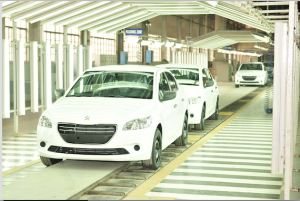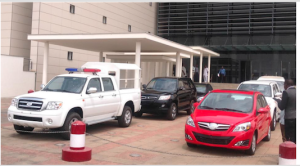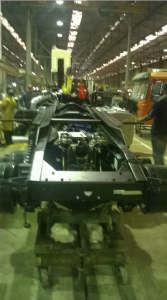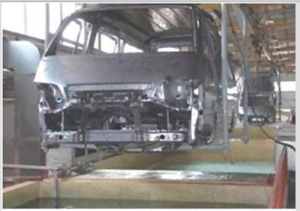
(By MOSES AKAIGWE) To the pleasant surprise of even those who manage the implementation of the National Automotive Industry Development Plan (NAIDP), the response of local and offshore investors to the initiative since its formal take-off on Tuesday, July 1, 2014, has been “very encouraging”.
However, NAIDP, generally referred to as automotive policy, has been slowed down by two major factors: The transition period between the end of Dr. Goodluck Jonathan administration and the take-off of the government of President Muhammadu Buhari; and the challenges currently confronting various sectors of the economy, especially scarcity of foreign exchange.
But, while the government has since assured that it would continue with NAIDP as inherited, and has actually taken measures to energise the implementation, lack of forex and the low value of the naira against the dollar, have for nearly two years combined to reduce capacity utilisation at the new or revived auto plants that have been operating since the policy was enunciated.

As is the case in all import-dependent industries across the economy, the assembly plants say they have been battling with the challenges of bureaucracy and sourcing scarce forex for the importation of the required {semi or completely} knocked down components. And even when they surmount the odds, the unusually high cost of vehicles produced discourages patronage.
Confirming this at his company’s assembly plant, United Vehicle Assembly Limited {UVAL} in Isolo, Lagos, the Managing Director of Kia Motors Nigeria, Mr. Jacky Hathiramani, lamented the effect of the paucity of forex supply on prices, volume of production and patronage.
He, however, disclosed that regardless of the enormous challenges, UVAL which assembles almost all Kia models available in the local market, has continued to produce without ceasing.
“Forex has affected the prices by 100 per cent ,“ Hathiramani told Daily Sun. “{And as a result} market size has dropped by more than 50 percent. So, we are also selling less than 50 percent of the volume we used to sell. “
Also, affirming the adverse effect of low value of the Naira and lack of foreign exchange, the Chairman, Innoson Vehicle Manufacturing Company Ltd (IVM), Nnewi, Dr. Innocent Chukwuma, said the plant never shut down as a result. Rather, it has managed to keep afloat till now that the situation seems to be giving signs of improvement with the interventions by the Central Bank which has lately been injecting dollars into the economy.

About a fortnight ago at ANAMMCO, Enugu, hundreds of Shacman trucks fresh from the production lines were seen being branded for the Dangote Group. Checks at the plant revealed that no fewer than 50 heavy duty trucks are assembled every week following a manufacturing agreement between Transit Support Services Limited (TSS), a subsidiary of ABC Transport, and ANAMMCO, to utilise the assembly facility.
Commenting on the deal, a manager at the plant said the good news was that the impacts of Dangote’s patronage, which it was learnt, runs into hundreds of units of Shacman trucks, and the subsequent partnership between TSS and ANAMMCO, were being felt in various ways at the plant and beyond. They include the recall of workers that were hitherto laid off, the resumption of full production and the engagement of suppliers from different parts of the south-east.
Reacting to the development at the nearby ANAMMCO, Chief Chukwuma hailed the patronage, saying that encouraging the purchase of made-in-Nigeria vehicles would ensure the survival of the auto companies engaed in genuine manufacturing in a recessive economy, as well as guarantee the success of the auto policy.
Since the policy initiative, about 14 assembly plants have commenced the production of new cars and SUVs of various brands, including Peugeot, IVM, Kia, Nissan, Hyundai, Honda, Volkswagen, Ford, Changan and GAC. In the bus and truck segments are Hyundai, Ashok-Leyland, MAN, Leyland-Busan, IVM, FAW, Sino, Shacman, Aston, Foton, Forland and Isuzu.

In March, another plant built in Ikotun, Lagos, for the assembly of JAC and Toyota models, formally commenced operations, even as Weststar Associates intensified the setting up of its plant, dedicated to the assembly of Fiat cars, also in Lagos. The plant where Higer buses will be assembled by Globe Motors, is being built in Lagos too.
To the National Automotive Design and Development Council (NADDC) Director, Policy and Planning Department, Mr. Luqman Mamudu, the sustained tempo of investments in auto assembly, is an indication that the policy is on course. “Why don’t you ask yourself the reason investors are building more plants. Is it for fun?”
Last week, Mr. Anil Sagal, the Director in charge of the auto section at Kewalram-Chanrai which opened a Foton plant in Isolo, Lagos exactly two years ago, assessed the situation in the industry since last year thus: “Forex has been the issue. It is the challenge we have been facing, but we have not stopped producing. Assembly of vehicles is on.”
This was not different from the response received from at PAN Nigeria last week. The assembly lines came alive again with the production of 301 following the coming into effect of the auto policy, but like other manufacturers requiring imported input, the plant located in the Kakuri area of Kaduna, has been facing serious foreign exchange challenges with knock-on effect on prices, among other things.
“But, we neither stopped producing, nor stopped selling,” a highly placed manager said
At the VON Automobiles in Ojo, Lagos, it was gathered that though the volume of production has ebbed, the plant has been operating ceaselessly, assembling Nissan vehicles like Almera, Sentra and Patrol, as well as some Hyundai models, including the new Creta. But, the vehicles, it was learnt, are produced according to demand.
Recently, the immediate past Director-General of NADDC, Engr. Aminu Jalal, said the regulatory body was not unaware of the rumours that the situation in the industry was an indication of the failure of NAIDP, and that government might be considering reversing the policy.
Jalal dismissed the insinuations as “baseless and unsubstantiated,” assuring that, rather, government would take more steps to reinvigorate the implementation of the policy towards achieving the goal of the diversification of the economy.
Also reacting, Luqman Mamudu remarked: “We don’t know of any automotive plant with unusually high unsold stock. The prices of all products with high import content have generally risen and the capacity of Nigerians to acquire has dropped. But, this doesn’t mean that every other sector has collapsed.
‘More assemblers are opening letters of credit to bring in more CKD kits. Their challenge, however, is forex, and we are discussing with the right sources for solutions. In any case, the credit purchase scheme we have been working on was designed to boost demand. So, the policy is still on track.”
Comparing the pre- and post-NAIDP years, Mamudu argued: “Installed capacity to assemble in 2013 was less than 60,000 units per year, but by 2015 when we last took stock, installed capacity for assembly had grown to 360,000 units. Actual assembly, however, peaked at only about 20,000 units that same year. This is slightly over 5 percent of capacity utilisation, but when you take the actual production of 2000 units in 2012 as the baseline, assembly operation increased 10 fold!! I think the industry is doing well under the circumstances”.
Vehicle prices have doubled in the past two years, but the auto makers are hoping that the with sustained injection of foreign exchange into the economy at the official rate, especially the auto industry, more SKD/CKD sets will be imported for the plants to resume normal production which will lead to a gradual reduction in price.
 ..:: AUTO REPORT AFRICA ::..
..:: AUTO REPORT AFRICA ::..





